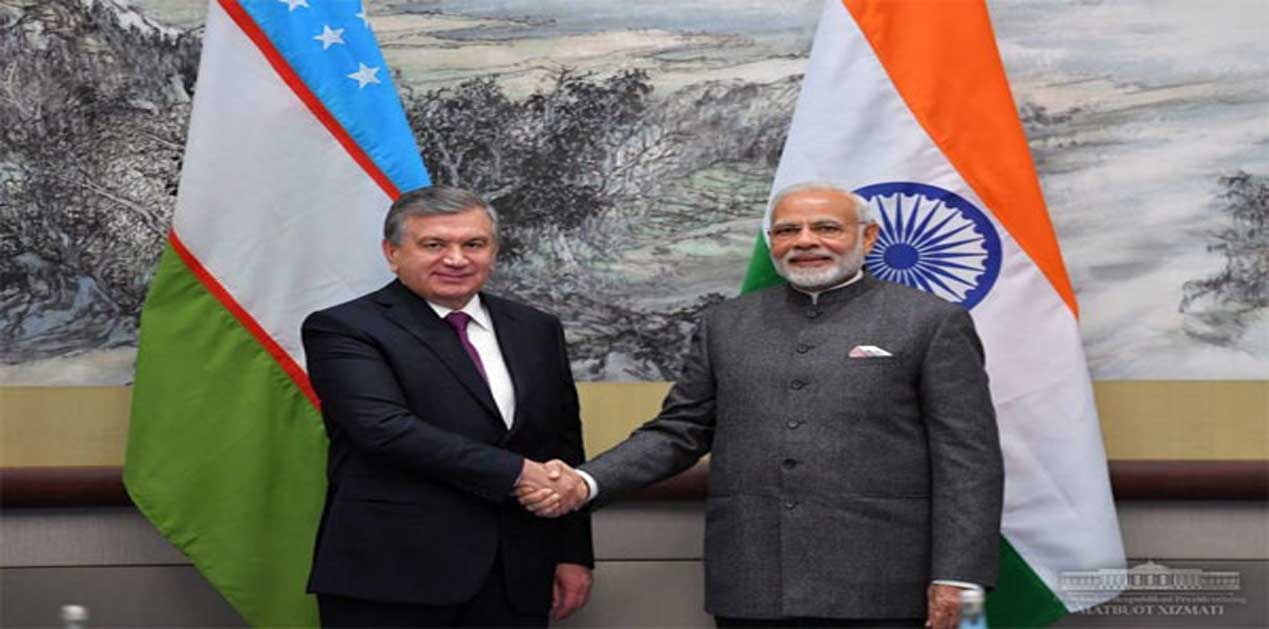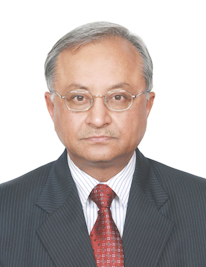The 2nd President of independent Uzbekistan was in India on 30 September and 1 October 2018 on a significant State visit. After the death of the first President Islam Karimov in September 2016, the then Prime Minister Shavkat Mirziyoyev was elected President of the Republic in December 2016 in a free and fair election. In the last 21 months President Mirziyoyev has introduced major reforms in his country leading to liberalisation of the polity as well as the economy. This first ever visit of the President Mirziyoyev to India was therefore very important both from political and strategic perspectives.
Prime Minister Narendra Modi and President Shavkat Mirziyoyev had met earlier in Qingdao in June 2018 on the margins of the Shanghai Cooperatyion Organisation (SCO) Summit. This visit followed Prime Minister Narendra Modi’s bilateral visits to Tashkent in 2015 and in 2016 for a Shanghai Cooperation Organization Summit. The Uzbek President landed in Agra which has a deep historical connection with Uzbekistan, as the founder of the Mughal Empire Babur had come from the Ferghana Valley. Reflecting this historic and cultural connection a MoU for partnership between Agra and Samarkand was signed during the visit.
In the Joint Statement issued after the visit, the two countries agreed to further expand the ‘Strategic Partnership’ which had been forged in 2011. The two delegations led by President Mirziyoyev and Prime Minister Modi had ‘friendly, substantive and constructive discussion’ and noted the ‘new positive dynamics in the Central Asian Region’ brought about by the transformative and accommodative policies of President Mirziyoyev. Seventeen important agreements and MoUs were signed during the visit which cover a diverse range of subjects. These include Tourism, Agriculture & Allied Sectors, Health & Medical Sciences, Pharmaceutical Industry, Science & Technology and Innovation, Military Education etc. Agreements were also signed for visa free travel for Diplomatic Passport holders and for increased dialogue between the two Foreign Offices.
The bilateral trade between India and Uzbekistan in 2017 was only about US $ 320 million. The two leaders recognized the potential for enhanced trade and have set a target of US $ 1 billion trade by 2020. India has extended a US $ 800 million Line of Credit through Exim Bank to facilitate exports from India. Non–ferrous metals and rare earths, textiles, automobile components and pharmaceuticals have been identified as priority sectors for future investments. Work will be initiated to formulate a Preferential Trade Agreement between the two countries. An Uzbek-India Business Council has also been established between the Uzbek Chamber of Commerce & Industry and the Confederation of Indian Industries.
An important agreement has been on the sale of yellow cake (Uranium) from Uzbekistan to India on terms similar to what India has with other countries like Kazakhstan. Some last minute wrinkles were ironed out during the visit with the strategic guidance of the two leaders. An ‘Uzbek-India Free Pharmaceutical Zone’ will be established in Andijon. A MoU for partnership between the Andijon Region and the State of Gujarat was also signed.
Another important decision is for Indian IT Companies to establish an IT Park in Uzbekistan. The idea is to form Joint Ventures in Uzbekistan to service the outsourcing and Information Technology Enabled Services (ITES) market in Russia by leveraging the software prowess of Indian IT companies and the Russian language skills of Uzbek IT professionals. For IT skill development of Uzbek youth, an Indo-Uzbek Center for IT was established in Tashkent in 2006 with India’s technical and financial assistance. This has been upgraded in 2014. The Uzbek side has expressed keen interest in inviting Indian educational institutions to create campuses in Uzbekistan focusing on vocational skills like tourism, hotel management etc.
Much of the discussion between the two delegations was on regional strategic and counter-terrorism issues. The two leaders welcomed the new political atmosphere in Central Asia and agreed to strengthen mutual cooperation in SCO and Regional Anti-Terrorist Structure (RATS) based in Tashkent. Uzbekistan reaffirmed its support to India’s candidature for permanent membership of the UN Security Council, and noted the request of India for support to its candidature for a non-permanent seat for UNSC for 2021-22.
The two sides have also agreed to strengthen defense cooperation. Possibilities in defense industry cooperation will also be explored. It was agreed to have a Joint Military Training Exercise in Counter-Terrorism. It was decided also to further enhance cooperation between the security agencies under the framework of Uzbek-India Joint Working Group on Counter-Terrorism.
Uzbekistan is a frontline state sharing a border with Afghanistan and the future peace and stability in Afghanistan was a major subject of discussion. The two countries advocated a ‘genuine Afghan-owned, Afghan-led and Afghan controlled peace and reconciliation process’. Under the leadership of President Shavkat Mirziyoyev, Uzbekistan is playing a leadership role to bring the relevant countries together to harmonize their policies towards a secure future of Afghanistan. With this objective Uzbekistan had hosted an international conference in Tashkent in March 2018 in which Minister of State Shri M J Akbar had participated. In the Joint Statement, the two sides agreed for ‘Close partnership for implementation of the Tashkent Declaration’ adopted at the Conference. India’s concerted efforts to develop new routes of connecting with Central Asia were discussed and Uzbekistan has reportedly agreed to join the International North-South Transport Corridor.
Uzbekistan had accorded much importance to the Presidential visit and high level delegations visited India to prepare the ground by interacting with India’s prominent Think-Tanks, Business Associations and potential investors. A delegation led by former Foreign Minister and now Senator Sadek Safaev had an intensive dialogue at the Vivekananda International Foundation on the eve of the visit. The discussions revealed that the Uzbek policymakers are very clear headed in their assessment about the security situation in Afghanistan. Expounding on the major challenges facing the international community in its attempts to stabilise the situation in Afghanistan they placed ‘Foreign Influence’ (read Pakistan) at the top.
The present day Uzbekistan is the cradle of Central Asian civilisation. With 30 million population it has more than half of the population of all five Central Asian Republics (CARs) and it shares borders with all the other four CARs. Under the positive and dialogue based neighborhood policy of President Shavkat Mirziyoyev, Uzbekistan is playing the role of an ‘integrator’ for Central Asia. Constant dialogue and interaction between the leaders and policymakers of the two countries would be very useful to ensure India’s positive long term engagement with Central Asia. This visit of President Shavkat Mirziyoyev is an important milestone which would chart a new course for future engagement between the two friendly countries.
(The author is a former Ambassador to Uzbekistan and Republic of Korea, and a Visiting Professor in Delhi University.)
Image Source: https://www.uzdaily.com/img/mirziyoyev/mirziyoyev-modi-china.jpg










Post new comment